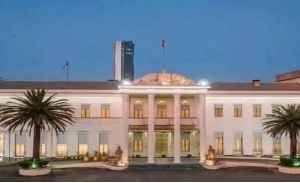

The recent diplomatic success in the Sudan by Ethiopia and the African Union (AU) is being given wide coverage and positive appraisals and even appreciation around the diplomatic world and media outlets. No doubt that the Sudanese peace deal signed last week between the ruling Military Council now in power in Khartoum and the opposition alliance is also the personal initiative and the brainchild of PM Abiy who takes the credit for playing a stable relations in the Horn of Africa where peace and stability in one country is a precondition for stability in the entire region.

The good news came last Saturday, August 4 as Sudan’s ruling generals and protest leaders reached a “full agreement” on the constitutional declaration, the African Union said, paving the way for transitioning to civilian rule.
It was reported that the agreement came after prolonged negotiations between Sudan’s ruling military council and the Alliance for Freedom and Change which has been leading the protest movement across Sudan for months.
“I am announcing to the Sudanese, African and international public opinion that the two delegations have fully agreed on the constitutional declaration,” AU mediator Mohamed El Hacen Lebatt told reporters.
The AU too must take the credit for averting, perhaps for the first time, the possibility of an implosion in Sudan following the democratic uprising that had gone through many ups and downs in the past few months. The AU failed to avert the Libyan debacle in 2011 as a result of which the country is now torn apart by various warlords who are busy killing their own people with the help of outside forces.
No doubt that the AU has learned a bitter lesson from its Libyan diplomatic paralysis that gave away the initiative to outside forces and looked on as the people of Libya were being butchered in broad daylight by ambitious and irresponsible politicians and high-ranking military officers now vying for personal power in that oil-rich country.
The diplomatic success in Sudan has proved that the AU has started to grow biting teeth and that it has abandoned its passive attitude towards impending conflicts, military coup d’états and dangerous implosions across the continent and in the Horn of Africa in particular. The Horn of Africa is like a game of domino and if you remove one piece, it is likely to take down the other pieces with it.
The domino effect is also dangerous because differences are not often resolved at round tables but in the battlefields. Once a country is allowed to plunge in conflict, it is generally difficult and sometimes impossible to pull them back. South Sudan is the best example.
For Ethiopia, the restoration of peace and stability in Sudan thanks to the agreement signed between the state and the opposition coalition has no doubt far-reaching significance. Ethiopia is a key or the most important country in the Horn as a stabilizing factor and as the inspiration of positive diplomatic initiatives. As such, it is expected to play a leading diplomatic role when it comes to dealing with peace and stability in the region.
It is also the biggest economic entity in the region that is seeking greater integration in the Horn. According to a recent article by New African magazine, “Abiy Ahmed wants to diversify Ethiopia’s trade routes by supporting greater economic integration and transport links in the Horn and wider East Africa, Regional peace is necessary to fully realize this integration, so that is likely a key driver of Ahmed playing a regional peacemaking role. What is surprising is however, Ethiopia’s diplomatic success in Sudan came in the midst of growing political turmoil in the region in the general and in Ethiopia itself in particular.
It is taking a two-pronged initiative while dealing with its internal problems at home while tackling Horn issues with the same vigor and commitment. This is a complex task that Ethiopia has achieved thanks to its position as an honest broker in the Sudanese conflict and its strategic interests in securing peace in the entire Horn region. This has obvious ramifications and wider consequences on relations between Egypt, Ethiopia and Sudan.
Recent Developments around the Great Ethiopia Renaissance Dam, or GERD, as it is known by its acronym, give great hope for peaceful resolution of difference if any arise in due course. The recent diplomatic shuttles by Ethiopian diplomats to Cairo and back has the purpose of securing mutual understanding and mutual confidence in the context of developments in Sudan. Adverse political developments in Sudan would likely impact Ethio-Egyptian talks on the Nile dam and the agreements previously signed between the three countries.
African Report, a publication by the International Crisis Group in its March 2019 issue wrote the following comment under the title, Bridging the Gap in the Nile Waters Dispute:
“The most active negotiations over the GERD have taken place in tripartite talks involving Egypt, Ethiopia and Sudan. The talks kicked off in 2011, soon after the announcement of the GERD, when the parties formed a trilateral joint technical committee to discuss a way forward. The parties notched an important achievement on 23 March 2015, when they endorsed a “declaration of principles” for resolving the dam crisis. The document calls on all sides to “cooperate based on common understanding, mutual benefit and good faith” and to take steps that prevent “significant harm” in using the Blue Nile.”
Egypt and Ethiopia have no conflicting interests on the Nile in general and on GERD in particular. Both countries work to develop their countries in an amicable and mutually beneficial way. There is no reason to do otherwise because the differences in perception that might arise between the two countries from time to time, can be resolved through the mechanisms of conflict resolution they have put in place. Foreign interests might try to foment misunderstandings between the two countries in order to promote their extra- African interests.
Egypt and Ethiopia are more closely tied together by history and destiny than any country outside the region might dream of. Egyptian and Ethiopian diplomacy on the Nile and/or on GERD are therefore in tune with their long-term interests. The recent political agreement between the Sudanese government and opposition forces is therefore of strategic importance because its implications transcend individual countries and impact the region as a whole.
The agreement has brought forth a refreshing perception that Sudan’s peace and stability is closely tied to peace and stability in neighboring countries as well as in the Horn in general. The Sudanese political settlement has also given the AU with a new modus operandi or a good precedence for resolving internal political differences in individual African countries. Its achievement in Sudan can serve as a model of future crisis management. This is also true for Egypt, Ethiopia whose future lies in economic cooperation rather than in disputes.
As an article in the Atlantic Council, suggested two years ago, “As they move toward a resolution, parties should focus on the opportunities that exist in relation to electricity sales, food imports, and future potential to engage in joint development projects in agriculture that can benefit the Tripartite as a whole.
Any agreements on the river should therefore include potential for joint economic engagement on river development, and future projects in farming, irrigation, and more advanced hydroponic technology.” In this sense Ethiopia’s diplomatic success in Sudan can be viewed as a victory for all parties involved in the region’s economics as well as its politics.
The Ethiopian Herald Sunday Edition 11 August 2019
BY MULUGETA GUDETA




